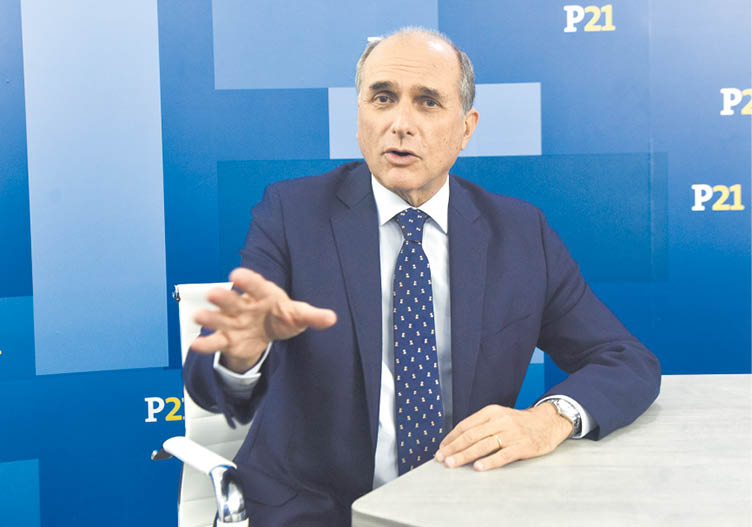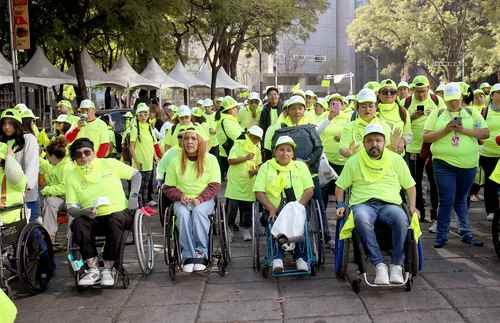Within days of Bicentennial of the Battle of AyacuchoHow to commemorate it?
The Bicentennial of Independence was not celebrated, which is highly unusual. It is abnormal for a country not to celebrate the Bicentennial. No country has made this rejection that the Government of Pedro Castillo to the Bicentennial. It was basically a rejection of the marrow, the heart of the Peruvian Republic.
The speech of Castle He was a divisionist.
Independence has to be a factor of unity because it is the creation of the Peruvian Republic. The primordial ideals of freedom, division of powers and self-determination are in all our twelve constitutions. The Bicentennial was very important to reiterate that political ideal and to reiterate the birth of the independent country. And yet, what should have been fantastic and is a fantastic element of national unity was despised by the Castillo Government, because Castillo was a Marxist, Leninist, Mao Tse-Tung Thought. So, of course, for him the Peruvian Republic was rubble. And that’s terrible.
The Bicentennial of Ayacucho is an opportunity to distance ourselves from that.
That’s how it is. The Bicentennial of Ayacucho is very important for that very reason: because it is a reparation. And the Government of President Dina Boluarte has to contain this; He has to internalize that he has to carry out an act of reparation on the Bicentennial of Ayacucho regarding the contempt to which the Bicentennial of Independence was subjected during the Government of his running mate.
Look: Controversy over the operation of lots I and VI of Talara
Speaking of reparations, do you remember any president absent due to surgery?
We are becoming Byzantine. Nor that she had undergone an operation that would have kept her completely out of action for a time. No such thing has happened.
How to address citizen insecurity?
Citizen security is important, but it requires a stabilizer, and that stabilizer is the relaunching of the economy. And that has to be the national objective. The economy cannot be relaunched from the State. When Castillo assumes the Presidency and then produces the coup d’état, more than US$20,000 million leaves the country. People get scared. So, it is necessary to relaunch the economy, which implies deregulating it, because since the Humala government to date a regulatory weed has grown of such caliber that it hinders mining, international trade, agriculture, in short. Really, the country is drowning in inefficiency. To make the country more efficient, it must, first of all, be deregulated. Second, eliminate unnecessary expenses. Third, facilitate the flow of capital to stimulate investment. We already know the recipe, we have already made it in the past. There is no mystery here. Only if the country takes off, progresses and becomes richer, does insecurity itself decrease, because conditions of greater social integration and greater dynamism are generated. And so there are more resources to face the problem. But now we are bogged down, we are bogged down.
How to break the judicialization of politics?
If the judicialization of politics did not exist, many capable professionals would participate. But, if they feel that their participation is going to be rewarded with jail, they prefer to abstain. The judicialization of politics scares away capable people. Basically it is a selection of the worst, a selection in reverse.
“WE ARE THROWING MONEY OUT THE WINDOW”
With the Port of Chancay, how to politically handle the friction between the United States and China?
Peru cannot handle the friction between the United States and China: let that be very clear. China produces 73% of the world’s manufacturing and is in a crisis at this time of deficit and economic slowdown. And the United States is an economic dynamo and the provider of capital flows to the world. This global conflict is not new, it is a decade old, and it goes beyond commercial matters. Now it involves the monetary. That is why President Trump has called on the BRICS (Brazil, Russia, India, China, South Africa) not to try to replace the dollar as the international currency. And it is also military, because there are claims in Asia, such as the one that China has over Taiwan; certain islands that are from the Philippines, anyway. It is an enormously complex situation. So, between two giants, Peru has no game. What Peru can do in a situation like this is create the conditions that give both powers peace of mind that Peru is precisely not part of the trade war game, that is, it is not in the conflict.
You have to stay out of the conflict…
I’ll give you an example: Panama. The Panama Canal is run by the Chinese, but it is not Chinese. It is not private property of the Chinese, not even in a percentage. It’s a concession. And there are no North American complaints about the management of the Panama Canal and it is because Panama has been careful to maintain its sovereignty over the canal. Peru has to adapt to that reality and adapting to that reality means guaranteeing that the port is Peruvian. Of course, it can be legally said that the companies are Peruvian, but we all know that one of those companies, the one that has 60% of the port, is from the Chinese State. That is what Americans object to. Also the exclusivity of the port. So, we still have to do work that, more than diplomatic, is internal politics. We must stay out of the trade conflict, calming the concerns of both giants, because they are two giants. One has no dimension in a global conflict that is commercial, financial and military. We have to be realistic about our size. That is the issue that was not foreseen. There was a very good business vision in the Port of Chancay, but there was no vision of foreign policy and what this represented for the powers that are facing each other in the world. There should have been much more coordination between private companies, the Foreign Ministry and analysts who could explain what the problems of the Sino-American conflict that Peru was going to get into were. And for providing a service. The idea is that this service is neutral.
He talked about deregulating and eliminating superfluous expenses. And reactivate formal mining?
It is enormously important. And there are also state issues whose reason for being, no one dares to say it, is purely ideological. Petroperú is a mixture of ideology and supposed acquired rights. In other words, it turns out that within the structure of Petroperú there are a lot of dukes, counts and marquises who feel they have absolute rights to their super salaries and to benefit from this public company. On the other hand, there is this myth of the 60s, of La Brea and Pariñas, which led to the coup d’état of General Velasco. This myth of national oil is the great ideological impediment to understanding that it is the private sector that has to risk its capital, not the State. Because? Because it is a concession. The resource belongs to the State, but it has to go to the private sector, because it is all Peruvians who pay the US$7 billion from Petroperú.
Petroperu It is the myth of the strategic company.
That’s a myth. The other myth is the agrarian issue. President Sagasti gave inconvenient labor legislation regarding the new agroindustry that had been born in the desert, where there was nothing before. It was largely successful and implied a formidable income of foreign currency for Peru. And yet, with the myth of the earth that comes from the 50s and 60s, a fatal intervention was made. They even released a documentary financed by the Ministry of Culture to applaud socialism on earth. You have to understand that they are not even valid economic and political theories. All that ended with the fall of the USSR. Socialism has been tried in 90 countries in the world and in all 90 countries it has failed. Even the Swedes have abandoned their supposed socialism. It just doesn’t work. China is the paradigmatic example: it maintains the rhetoric of communism for the social control of its population, but in practice what it is interested in is getting the most out of the market. Cuba and North Korea remain. I don’t know if those are the models of the Peruvian left, it seems so. The Peruvian left is very anachronistic, it lives in the 70s of the last century.
Does the Government still live with these delays?
I do believe that there are those delays. Yesterday there was a discussion about the inauguration of a school called Javier Heraud, which has led to a protest by retired officers of the Armed Forces. It was inaugurated by the president. I think there is a mentality that can adapt to constitutionalism, but that does not mean that psychology changes. Castillo sang Flor de retama, while president, in Ayacucho. The mentality is there, unfortunately.
Maybe that’s why he didn’t insist on going anyway CADE?
I have the impression that she believes that economic reactivation can be carried out by the State through public spending. However, that is fractional with respect to the total investment that a country has to have.
What message should be given with a view to 2025?
The Government must give a message of guarantee that it will do everything possible to reactivate the economic life of the country, guarantee the security of Peruvians and conduct an impeccable electoral process. There is a shadow of doubt, arising from the last two elections, on the issue of electoral transparency. That has to be dispelled. And it is also necessary to unblock the economy to prevent insecurity from growing, because the issue of insecurity grows in spaces of unemployment and marginality, and the only way to reduce these spaces is by reactivating the economy.
The crisis caused the quotas for transporters to double. The more crisis, the more crime.
Correct. There is a direct relationship between the collapse of the economy and crime; between unemployment and marginality and crime. Let’s remember the 80s with the kidnapping gangs. All of these become criminals precisely because they are roaming the streets.
In addition to illegal economies.
There is great chaos in the country, general anarchy. The way to deal with it is only by simplifying economic regulations and allowing the flow of capital. For example, giving conditions for investment and amnesties for capital repatriation. There are a number of measures that have been taken in the past. We know how this works. Due to its volume, this would drown out informality. Once the economic process is simplified, there is confidence and capital arrives, and the amount of formal investment is so infinitely higher than the informal economy that it suffocates it. And there the country changes course.
It is not just about combating informality with the police, it is about making the formal economy grow.
Correct. If today formality is worth 60 and informality is worth 40, the idea is that formality is worth 90 and informality is worth 10. And the only way is to create the legal and economic conditions that allow a greater influx of capital into Peru. Deregulating, simplifying, giving a boost to investment and, at the same time, reducing public spending. We are throwing money out the window. This money must be invested in connectivity to provide access to markets and accelerate economic processes.
“They filed the cases against Trump because they were very weak”
Was South Korea an attempted coup?
There is no solid explanation as of yet. What he definitely wanted to do is concentrate power, but alleging what was ultimately a fallacy: that among his opponents were allies of North Korea, something very difficult to believe. The fact is that the South Korean Police have opened an investigation against the president. In the course of that investigation we will know what happened. It must be taken into account that the president did not want to close Congress. What he wanted was to declare a Martial Law, which is more than an emergency, it is a State of Siege that concentrated powers in the Executive. The purpose of that is what is not known.
Biden has used justice to his advantage, which is what Trump was thought to do.
The Trump thing was a hypothesis. We must be guided by facts. They filed the cases against Trump because they were too weak. What has happened due to the weakness of the processes themselves is normal. There has been no judicialization of politics. Hunter Biden is a case of nepotism. It is highly unusual for the father to pardon the son.
RECOMMENDED VIDEO
















